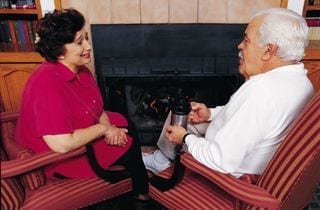 The number of Americans who provide home care for older adults and adults with Alzheimer’s or other forms of dementia is staggering. According to the Bureau of Labor Statistics, more than 41 million Americans provide care to older adults. The Alzheimer’s Association reports that more than 15 million provide care for someone with dementia.
The number of Americans who provide home care for older adults and adults with Alzheimer’s or other forms of dementia is staggering. According to the Bureau of Labor Statistics, more than 41 million Americans provide care to older adults. The Alzheimer’s Association reports that more than 15 million provide care for someone with dementia.
The University of Michigan’s National Poll on Healthy Aging paints an interesting picture of the many Americans who have taken on the responsibility of caregiving, as described in an article appearing in Consumer Reports, “What It's Like Being a Dementia Caregiver Detailed in New Report.” While the responsibility appears very stressful, many also find it to be very rewarding.
That group of 15 million Americans was the subject of a November report from the University of Michigan’s National Poll on Healthy Aging. Consumer Reports notes in its recent article, “What It's Like Being a Dementia Caregiver Detailed in New Report,” that the results show being a caregiver to someone with dementia is an experience with great challenges and great rewards.
From the outside, it can look extremely stressful, the associate director of the Michigan poll said. However, many people also find rewards in the experience.
Although 78% of the caregivers who responded to the poll said the experience was “very or somewhat stressful” and two-thirds said caregiving “interferes with [the] ability to take care of themselves or their daily activities,” about 85% described caring for someone with dementia as “very or somewhat rewarding.”
The new report also found that, despite the stresses and concerns, only 27% of caregivers had taken advantage of caregiving resources like family therapy and support groups. Here are a few tips on how to make caring for someone with dementia more rewarding and less stressful.
- Educate yourself on dementia. Understanding the disease itself can help caregivers better appreciate the behaviors that are associated with it and to respond accordingly.
- Planning. Don’t wait until there is an emergency. That means estate-planning documents, like a power of attorney and healthcare directives should be signed well before someone begins having trouble speaking on his or her own behalf. Caregivers should also consider the types of additional future care that might be needed and plan for how to pay for that care. Talk with an elder law attorney to get the process started.
- Self care is very important. Caregivers will be able to do a better job of caring for someone else if they also take care of themselves. That includes establishing and maintaining good sleep habits, eating healthy and nutritious meals and allocating time away from caregiving responsibilities. The task of providing care for someone often extends for many years, and the stress is cumulative. You may feel fine for the first year or so, and then in the second year, things may seem a bit more strained. Plan for breaks, even vacations, if possible, to avoid mental and physical exhaustion.
Reference: Consumer Reports (November 3, 2017) “What It's Like Being a Dementia Caregiver Detailed in New Report”
